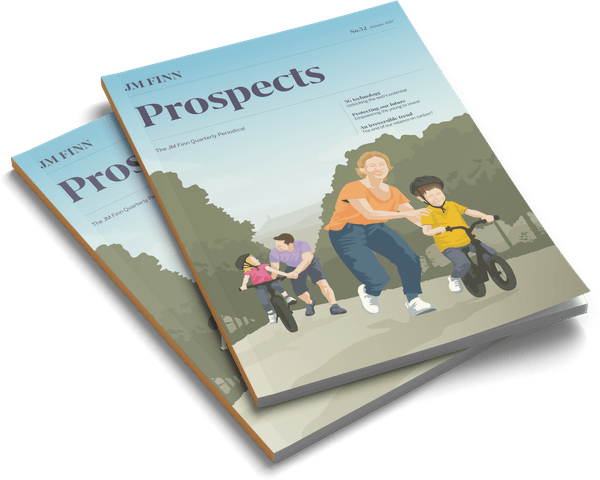For the next 8 ½ years, this radical opportunity to empower a generation of disadvantaged young adults will be with us. Gavin Oldham OBE, founder & chair of The Share Foundation looks at the societal challenge of intergenerational wealth transfer.
If it works, Gordon Brown and Ruth Kelly will have shown the world how to solve one of the greatest economic dilemmas: how to retain the vibrant wealth creation attributes of capitalism, whilst at the same time allowing each new generation the chance to benefit.
The sheer scale of the ‘intergenerational re-balancing’ Child Trust Fund scheme, a world-leading initiative in individually-owned, asset-based welfare, is huge. Individual accounts are securely in place for all children born between 1 September 2002 and 2 January 2011 in the United Kingdom, now valued at a total of c. £9 billion. It presents a huge opportunity, but also a huge challenge.
The challenge lies in the fact that about two million of these accounts are either ‘Addressee Gone Away’ or unclaimed with a total of c. £3 billion, and that the greatest rate of these un-linked accounts applies to the most disadvantaged young people.
Sharefound’s aim is to enable young people to leave care at 18 years old with both the material resources and the knowledge to achieve their potential. Since established in February 2005, they have been working with the Government’s two investment initiatives for young people: the Child Trust Fund and the Junior ISA.
Giving young people some money with which to start life is, however, only half the story. The other half is to build that vital sense of ownership - and responsibility - which comes with learning financial awareness.
There is a big problem with economic demographics: wealth is hugely concentrated in the old but, because birth rate is inversely proportional to wealth, there are not many young in their families to benefit from their inheritance. So when wealthy old people die, governments stand ready to seize a large proportion of it as Inheritance Tax: but they do not currently distribute those receipts to disadvantaged young people, but instead burn it off as current public expenditure – an entirely unproductive process for future generations.


The Share Foundation’s recovery campaign for CTFs is an effective search facility, developed in liaison with HMRC to build a simple application process via https://findCTF.sharefound.org
There have been a number of studies, which spell out this problem in detail. For wealth concentration by age cohort, the ONS study of Total Wealth in Great Britain and, in particular, its figures 5 and 9 highlight the point. And for a more digestible read focused on the United States, the article ‘The Staggering Millennial Wealth Deficit’ by Christopher Ingraham of The Washington Post on 3 December 2019, shows the dramatic contrast between the baby boomers, Generation X, and the millennials. There is no question here - not only is wealth concentrated in the old, but also young adults can’t get started in the same way as baby boomers did, 30-40 years ago.
The reason for this is also demographic: wealthy people simply do not have as many babies as poorer people, so natural inheritance within their families can’t do the job of empowering the next generation. A comparison of birth rate with GDP in different countries shows clearly that young people of the future will be predominantly, and disproportionately, born into poverty.
We must therefore do intergenerational re-balancing if we want a vibrant capitalist economy in the future - the only other solution is socialist deployment of wealth by governments through public expenditure, as the ruling class see fit. That is why the Child Trust Fund is so important, and I hope that it will not be long before the UK Government re-introduces a similar scheme (on a more progressive basis). However, there is one additional ingredient I would like to see in it - Incentivised Learning.
The reason that micro-finance works so well is that it’s based on loans, not grants: so beneficiaries build a sense of accountability and responsibility. This is the difference between ‘give people fish and you’ll feed them for a week – teach them how to fish, and you’ll feed them for a lifetime’. Incentivised Learning does the same – I would like to see a new Child Trust Fund (or whatever HM Treasury chooses to call it) started with £1,000, with an additional £1,000 at age 7, then - critically - with £3,000 more to be earned between ages 15 and 17 as a result of progressing through a programme of life skills and financial awareness.
The Share Foundation already does this for young people in care, who can earn an additional £1,500 in their Child Trust Funds by taking our six-step ‘Stepladder Plus’ programme. The contrast in progress between the incentivised and standard versions is dramatic. Incentivisation builds a real sense of ownership and accountability.
We should all should sit up and take notice of the need to develop a new, young generation with financial awareness and assets. The young are the future for our country and the world - we must endow them and empower them so that they can deliver fair and just opportunities for all in the future.
Gavin Oldham OBE, founder & chair of The Share Foundation was also founder and Chairman of The Share Centre. He is also founder and Managing Director of Share Radio, an online broadcaster whose purpose is to help people to become more confident with money and in business. Gavin is an elected member of the Church of England's General Synod (Oxford Diocese), and was a Church Commissioner (and member of its Assets Committee) for 18 of the past 20 years. He was a board member of pfeg, the personal finance education group, until it merged with Young Enterprise in 2014.
gavin.oldham@sharefound.org
Illustration by Adi Kuznicki




